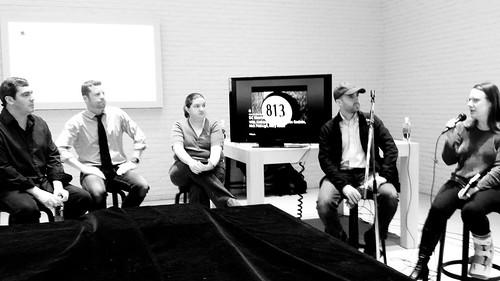
Directors are auteurs, in charge of hundreds of people and with millions of dollars at their disposal, right? Think again. Easy-t0-use cameras and Internet technology allow anyone with a story to tell to make a movie. This was highlighted by the recent talk by four Washington-area filmmakers at the Apple Store in Georgetown. They’re all alumni of DC Shorts, with films or scripts that appeared in this local festival.
Arlin Godwin wanted to make a short film but didn’t want to deal with actors. Over a couple of weekends, in his own apartment, he made the delightfully creepy Man in 813. It won Outstanding Local Film at DC Shorts. Fascinating to me was the fact that he shot it with a Canon T2i (a digital still camera) and primarily used the “nifty fifty” lens, a $100 prime lens beloved by photographers.
A man who had no qualms about dealing with actors is Anthony Brenneman. He’s part of what I’ve called the AU mafia of filmmakers. Anthony has a soft touch with actors which is evident is his short film Frienemies. It’s a topical story about high school rivalries playing out in the digital age. In future projects, he wants to concentrate on his strengths – directing and working with actors.
Mary Ratliff is one of my favorite local filmmakers. She was a finalist in the DC Shorts Screenwriting Competition (where I’m a judge). Mary is making Good Game, a documentary about an elite video gaming team preparing for a Starcraft tournament. It’s a fascinating look at a subculture most Americans are unaware of – you can make a living playing video games? Key to her endeavor was winning the trust of her subjects. She did so by being a passionate gamer herself.
With a love of soccer, Nick Fitzhugh wanted to make a documentary in South Africa during the World Cup. He looked beyond the bright lights and big stadiums and produced Soccer City. This documentary (originally a series of webisodes) follows five soccer players in one of the country’s largest and most notorious townships. You can see it on ESPN Classic on Nov 5 at 5 PM ET or at the Rosebud Film Festival on Nov 12.
These four stories illustrate that you don’t need millions of dollars or Hollywood connections to make a movie. You just need an interesting story to tell.
A couple of technical notes:
- Everyone except Mary used Final Cut for editing.
- Canon DSLRs (T2i, 7D, 5D) are popular but once you add gear for sound and other tools their price/convenience factor disappears.
- The ease of shooting digital video leads to data management challenges, i.e, how do you collect, store and organize all the footage you shot?